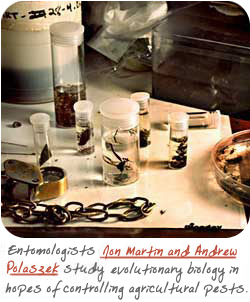|

To piece together the clues of evolutionary biology,
researchers spend countless hours in the
field
and
lab
. What
drives them in their work? And what makes it important
to the rest of us?

|

|
|
Biologists can sometimes use their knowledge of how species relate to one another
to restore ecosystems to their natural balance.
For example, if a species begins to overpopulate
an area, introducing new predators could
help keep its numbers down.
Zoologist Mark Wilkinson talks about the
future of biology.
(audio file with transcript)
|

|
|